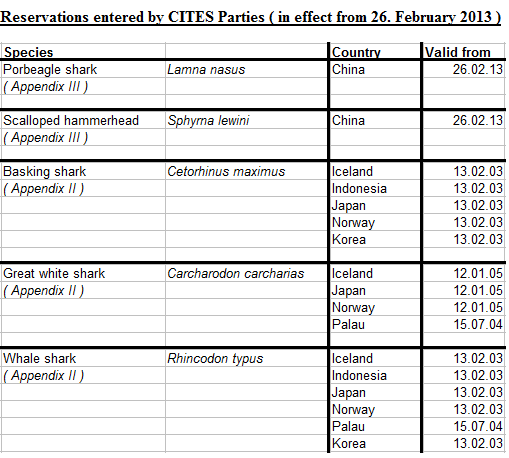China ignores CITES Appendix III listing of two shark species
Helmut Nickel, Shark Year Magazine, 02. May 2013According to a CITES Notification to the Parties ( released on 09. April 2013 ), the CITES Secretariat has been informed that, on 26. February 2013, China entered reservations concerning the listing of the porbeagle shark Lamna nasus and the scalloped hammerhead shark Sphyrna lewini in Appendix III of the Convention.
The decision to list the two shark species under the third CITES Appendix was made by the European Union in February 2012 ( Lamna nasus, see here ) and Costa Rica in March 2012 ( Sphyrna lewini, see here ).
Appendix III is a list of species included at the request of a Party ( in this case the EU, Costa Rica ) that already regulates trade in the species and that needs the cooperation of other countries to prevent unsustainable or illegal exploitation.
The porbeagle and scalloped hammerhead shark also belong to the five shark species that were approved for listing on CITES Appendix II at the 16th CITES Conference of Parties in Bangkok recently ( see here ).
But the source clearly states that China’s reservations concern only the Appendix III listing of the two species. Basically, it means that China refuses to cooperate with the EU and Costa Rica to prevent unsustainable or illegal exploitation of the porbeagle and scalloped hammerhead shark.
I assume that these reservations will most likely affect the shark trade only for the next 17 months. Because the Appendix II listing of the species will become effective in September 2014 and, until now, it seems that no reservations concerning the forthcoming Appendix II listings have been entered …. NOT YET !!!
What do ‘ Reservations ‘ mean ?
Any member State of CITES may make an unilateral statement that it will not be bound by the provisions of the Convention relating to trade in a particular species listed in the Appendices (or in a part or derivative listed in Appendix III). These statements are called reservations.
Although all Parties have the right to enter reservations, they can cause implementation problems. The Conference of the Parties only recommends that parties that have entered reservations with regard to the inclusion of a species in Appendix I should treat the species as if it were in Appendix II and should include records of the trade in these species in their annual reports.
Below is a table that shows all shark-related reservations that were entered by CITES parties, in effect from 26 February 2013.


China will kill everything in sight and when animals are gone they will eat each other.
Gina,
We can only prey that they leave the animals & eat each other instead.
I agree!!!!!
True true!
Be responsible or nature will deal with us in. Due course
we really need to get concerned. together we can save nature